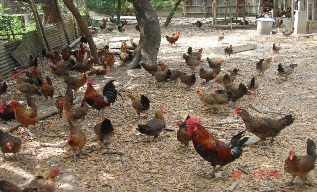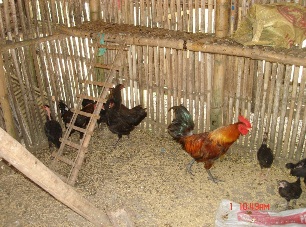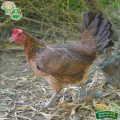Native chicken meat has always been preferred by consumers over that of commercial broilers due to its unique taste, distinct flavor and texture, presence of nutraceutical compounds (functional food), and lower fat content.

A brood of native chicken raised in a farmer’s backyard (Photo credit, Livestock Research Division, PCAARRD)
Being free ranged, native chicken is generally perceived as free from antibiotics and other synthetic chemical residues. The global trend of shifting consumer preferences toward organic and naturally produced products in recent years justifies the premium price offered for native chicken over that of its commercial hybrid counterpart. A similar trend is also observed in the Philippines wherein the volume of supply (e.g. 500 kg to 2 tons per month) required by institutional buyers has significantly increased.
Native chicken constitutes 46% of the total chicken population in the country, which is around 76 million head. This local genetic resource provides livelihood in terms of additional income, food security and opportunity to convert farm wastes & by-products into high value products (i.e. meat and eggs). Native chickens also provide socio-cultural services to rural communities.
In spite of its huge potential, the native chicken industry has two major challenges that need to be addressed—the unstable supply of slaughter native chickens and the high mortality rate of 40%.
Recognizing these problems, the government laid down the Industry Strategic S&T Program (ISP) for Native Chicken. This was meant to initiate S&T-based programs that will improve and profitably utilize native chickens by rural farmers in Regions 5, 6, 7 and 9.
To date, the Program has developed breeding and free range production protocols for the four NC strains, namely, Darag, Camarines, Manok Bisaya, and Zampen. The protocols were supplemented with a Free Range Production Module to further enhance capacities of rural farmers on production and management.

A brood of native chicken provided with housing to ensure their safety against bad elements that may adversely affect their production (Photo credit, Livestock Research Division, PCAARRD)
To address the high chicken mortality, ethnobotanical anthelmintics were developed to control problems on gastro-intestinal parasitism. Moreover, local production of oil-emulsion Newcastle Disease (NCD) vaccine is also pursued to control the annual NCD outbreaks that cause about 90% mortality in infected native chicken flocks. With these S&T interventions, 11, 579 head of breeder quality and 105,095 head of slaughter Darag chickens have been produced in Region 6. Inspired by the apparent success achieved in Region 6, the Program is currently being replicated in three other regions where Camarines, Manok Bisaya, and Zampen native chicken strains are produced. Gains from these interventions are expected to meet the increasing demand for native chickens in the country.
The ISP for Native Chicken, among other ISPs, as a program, has been conceived by the government through the Philippine Council for Agriculture, Aquatic and Natural Resources Research and Development of the Department of Science and Technology (DOST-PCAARRD) in 2012. The Program seeks to provide the vision and direction for all actors and key players in the agriculture, aquatic, and natural resources sectors in the Philippines.
DOST-PCAARRD will showcase these technologies under the Native Chicken ISP, including other agri-aqua science and technology (S&T) outputs on March 2-4, 2016 during the Council’s SIPAG FIESTA at its headquarters in Los Baños, Laguna.
SIPAG, a technology transfer strategy, embodies the Council’s commitment to DOST’s Outcome One in a bid to ensure that the fruits of R&D activities for the agri-aqua sectors will be a blessing for every Juan.
by Livestock Research Division, DOST-PCAARRD S&T Media Service






